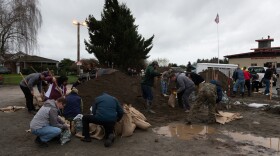Temporary fans and sump-pump hoses are whirring along inside the West Point Treatment plant. It’s still dark inside the tunnels where on February 9, a flood of sewage busted doors off and submerged everything up to 12-feet high.
Where we’re standing, we would have been underwater. Plant manager Robert Waddle switches on a flashlight to show me around.

“So every electrical panel you see here has either been replaced or will be replaced, a lot of our power is coming in; it’s temporary. You know, we have 140 motors that need to be replaced. And each of those motors runs a pump and each of those pumps will need to be rebuilt,” he says.
Not Just Mechanical Fixes
They’ve scrubbed and disinfected everything. They’re rewiring and replacing fixtures. But one critical thing that powers this plant can’t just be switched back on — because it’s alive.
Inside the plant’s digester towers is a delicate mix of microorganisms. They clean sewage and wastewater sludge by eating it.
“Once they’re up and running, they’re actually up and feeding, they’re fairly robust. They see a fairly dynamic range of food sources coming in, in the sewage,” Waddle says.
And one thing their eating produces is methane, which in turn powers pumps and boilers that keep them at the right temperature – roughly the same as human body heat, about 98 degrees. But when the plant went offline, Waddle says everything stopped working and the microorganisms went into hibernation.
“They’re hibernated because they got really cold. They’re normally at 80 to 90 degrees. That dropped into the 60s during this process,” says Waddle.
And the plant workers have to be careful as they bring the digesters back online, warming them up gradually using propane for now. Rushing could cause even worse damage, adding months instead of weeks to the process.









